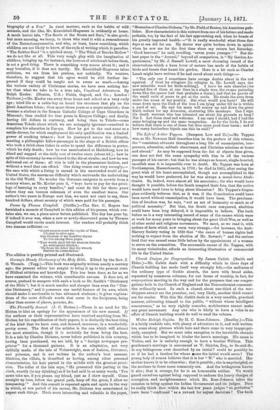The Life of Arthur Tappan. (Sampson Low and Co.)—Mr. Tappan,
was, as Mr. Newman Hall describes him in the preface of this volume,. the "consistent advocate throughout a long life of emancipation, tem- perance, education, sabbath observance, and Christian missions at home and abroad." As may be supposed from the list of objects thus given, one does' not feel the same sympathy with him in all the various. passages of his career ; but that he was always an honest, single-hearted, unselfish man it is impossible ever to doubt. Mr. Tappan was born at Northampton, Massachusetts, in 1786 ; he died in 1865, after seeing the great wish of his heart accomplished, though not accomplished in the way he would have preferred, for he was always a moral-force Aboli- tionist. So, indeed, were almost all his associates; for who would have thought it possible, before the South tempted their fate, that the nation, would have used force to bring about liberation ? Mr. Tappan's biogra- pher evidently believes that, as it was, if the Constitution could have been saved without emancipation, it would have been. The proclama- tion of freedom was, he says, "not an act of humanity so much as of political necessity." But that, the South once conquered, abolition, could have been long delayed, it is impossible to believe. The book before us is a very interesting record of some of the causes which were- at work for many years in bringing about the great Civil War, as well as of other social and religious movements. We meet, as we read it, with• notices of facts which now seem very strange,—for instance, the Anti- Slavery Society voting in 1838 that " the cause of human rights had nothing to expect from the election of Mr. Seward; " and the serious. feud that was caused some little before by the appointment of a woman to serve on the committee. The mercantile career of Mr. Tappan, with its many vicissitudes, affords an interesting illustration of commercial life in the United States.


































 Previous page
Previous page